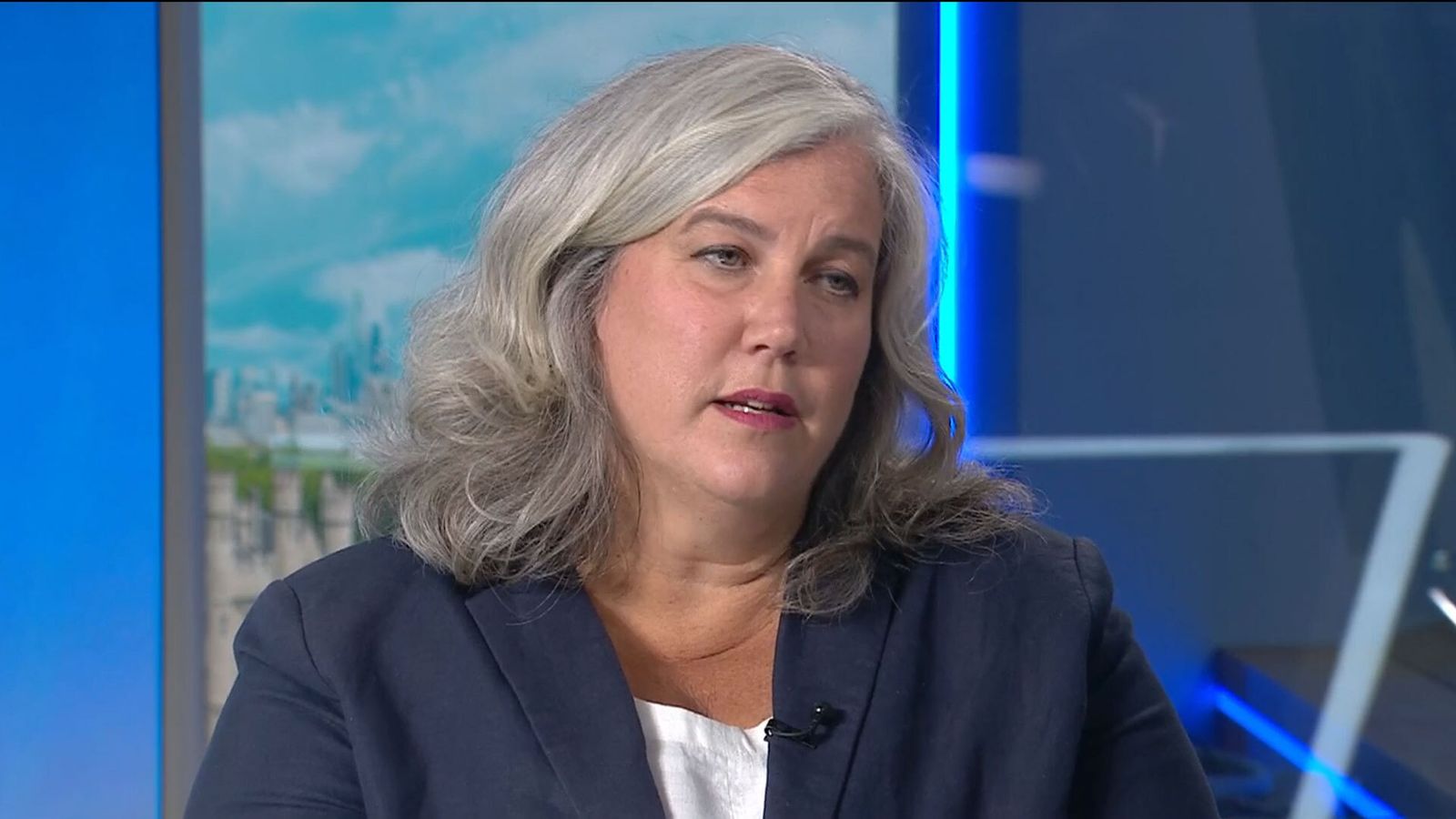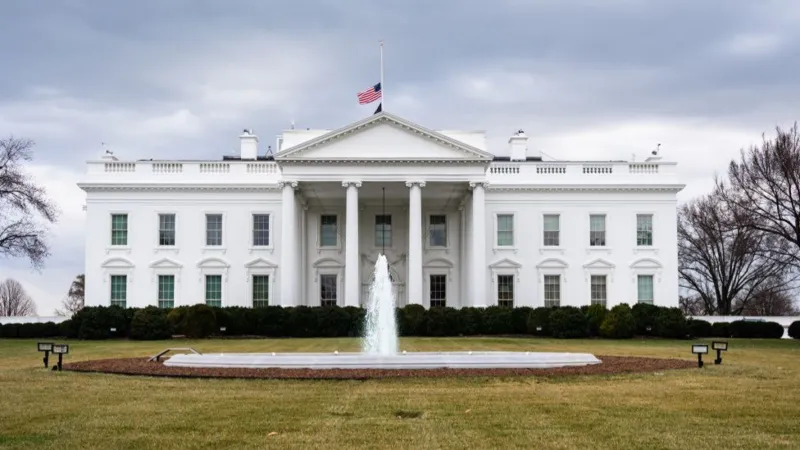US averts shutdown as Trump sets the stage for his presidency
US averts federal government shutdown

Biden signs stopgap funding bill into law, according to White House
President Joe Biden signed the stopgap funding bill into law Saturday morning, according to an update from the White House.
The Senate passed the bill not long after midnight — technically after the funding deadline, but nevertheless averting a shutdown that would have had widespread impacts. The House passed the bill Friday evening.
The legislation extends government funding into March and provides disaster relief and farm aid, but does not include a suspension of the debt limit, which President-elect Donald Trump had demanded Republicans address.
Bipartisan bill to increase Social Security benefits heads to Biden's desk
The US Senate passed a bipartisan bill early Saturday to increase Social Security benefits for close to 3 million federal, state and local public sector workers, which includes firefighters, police officers and teachers.
If the legislation is signed into law by President Joe Biden, it would apply to all benefits payable after December 2023.
The Social Security Fairness Act — which already passed the House with overwhelming bipartisan support in November — eliminates two policies that have reduced Social Security benefits for public service employees. This will affect workers who are eligible for government pensions from jobs where they didn’t pay into Social Security but who did pay into the program through other jobs, or whose spouses did so.
The first is the Windfall Elimination Provision (WEP). “The WEP reduces benefits for retired or disabled workers who have fewer than 30 years of significant earnings from employment covered by Social Security if they also receive pensions on the basis of noncovered employment,” according to the Congressional Budget Office.
The second provision that will be eliminated is the Government Pension Offset (GPO). “The GPO reduces the spousal or surviving spousal benefits of people who receive pensions on the basis of noncovered employment,” CBO noted.
Criticism: Those who are critical of the legislation cite the fact that it is unpaid for and say it will hasten Social Security’s insolvency date.
The CBO estimates the legislation will cost nearly $200 billion over 10 years.
Johnson joked about his fate as speaker throughout spending negotiations, lawmaker says
Throughout the government funding negotiating process, particularly when lawmakers reached an impasse, House Speaker Mike Johnson returned to a similar joke: He welcomed anyone else who could get 218 votes.
It takes 218 votes to establish a majority in the lower chamber — and to hold on to the speakership — when every member casts a ballot.
“He said that a lot. He does crack that joke quite a bit,” GOP Rep. David Valadao, a key House appropriator who was at the negotiating table, told CNN.
“In reality, I think we all know that getting to 218 in this conference today is not an easy task for anyone,” Valadao added. “These past two years have been a little bit of a roller coaster, and we expect that to continue.”
Some context: Many lawmakers left for the holidays frustrated at Johnson for leaving them in the dark for much of the negotiating process, or for how he created a lot of angst by pivoting his government funding plan at the last minute, only to revert back to essentially his original position.
But most Republicans are hoping that time away for the holidays will ease the tensions of the real divisions that exist within the narrow House Republican majority. And very few actually are ready to oust Johnson.
For now, Johnson has something in his back pocket that has been his human shield: the support of President-elect Donald Trump.
“President Trump says he’s supporting him, and I’m supporting him,” Republican Rep. Mike Collins said.
Booed in MAGA world: While Johnson may be maintaining Trump’s public support, he’s been facing criticism from the president-elect’s supporters at a conservative gathering in Arizona this week, where a mention of the speaker elicited boos during a Friday speech. Former Trump aide Steve Bannon said at Turning Point USA’s “AmericaFest” conference Thursday that Johnson should be removed from the speakership.
CNN’s Aaron Pellish contributed reporting to this post.
Romney says his final vote was to "protest" the "absurd way" government is run
Republican Sen. Mitt Romney said he voted against the stopgap spending bill in “protest” of how the government is run.
“While I support keeping government open, I voted no on the CR—a simple protest of the absurd way this is to run government,” the outgoing senator from Utah posted to X.
Elected to the Senate in 2018, Romney has become known as a distinctive voice in the chamber who was willing to take on his own party. Romney announced last year he wouldn’t run for reelection, calling for a “new generation of leaders.”
The Senate voted to pass the stopgap funding bill early Saturday morning, averting a government shutdown — despite missing the Friday midnight deadline — and sending it to President Joe Biden to be signed into law.
RFK Stadium bill would give control of land to DC
In an early morning surprise, the Senate unanimously passed a bill giving Washington, DC, control over the land around the defunct Robert F. Kennedy Stadium on Saturday.
HR 4984, the DC Robert F. Kennedy Memorial Stadium Campus Revitalization Act, previously passed the House 348-55 in February. If signed into law by President Joe Biden, the measure would transfer the land around the stadium from the federal government to DC — paving the way for the stadium to be redeveloped, and for the NFL’s Washington Commanders to return to the location after spending the last 27 years in Landover, Maryland.
The measure was part of the initial government funding package brought by House Speaker Mike Johnson on Wednesday, but it was not included in the bill passed shortly after midnight.
The Commanders have played at Northwest Stadium, formerly known as FedEx Field, in Maryland since 1997. The franchise previously played at RFK Stadium from 1961 until 1996.
NFL Commissioner Roger Goodell and Commanders majority owner Josh Harris — who bought a controlling stake in the franchise in July of 2023 — were on Capitol Hill earlier this month to round up support for the provision. DC Mayor Muriel Bowser had long pushed for the land around RFK to be transferred to the District.
CNN has reached out to the Commanders for comment.
Senate passed pediatric cancer research bill after it was dropped from negotiated stopgap funding bill
On Friday night, the Senate unanimously passed the Gabriella Miller Kids First Research Act 2.0, which reauthorizes a pediatric cancer research initiative through the National Institutes of Health into 2028.
This provision had originally been part of the stopgap funding deal negotiated by congressional leadership, but it was dropped after President-elect Donald Trump insisted on a “clean” short-term spending package, without extra measures included.
Earlier this week, House Republicans pushed back on outrage over the funding being cut from the package, arguing that Senate Democrats were to blame for waiting months to bring up the bill. The House had passed the research funding reauthorization on March 5.
Here's what's in the government funding agreement — and what didn't make the cut
The Senate approved a slimmed-down, temporary government spending plan early Saturday morning, averting a shutdown of the federal government.
The legislation now goes to President Joe Biden for his signature, and the brief lapse beyond a midnight funding deadline is not expected to have a significant impact.
The passage of the package came after President-elect Donald Trump torpedoed a bipartisan agreement struck earlier in the week. A House vote on a Trump-endorsed funding bill failed on Thursday evening, but the chamber then approved a revised bill Friday evening.
The legislation funds the government through March 14, setting up another spending showdown in the early days of the Trump administration.
Here’s what else is in the bill:
- More disaster aid funding: The spending bill provides about $100 billion to help Americans trying to recover from multiple natural disasters in 2023 and 2024. The funding is in line with the roughly $100 billion topline request from the Biden administration in November.
- Economic aid for farmers: The bill includes $10 billion in economic aid for farmers, one of the last sticking points in negotiations earlier this week. Lawmakers from agriculture-focused states have argued that the help is desperately needed as the US’ farmers are facing lower commodity prices and higher costs for supplies.
The spending agreement also includes a one-year extension of the farm bill — a sweeping package that governs many agricultural and nutrition assistance programs.
- Maryland bridge funding: Under the the bill, replacing the Francis Scott Key Bridge in Maryland will be fully funded by the federal government. The legislation will also allow the US Treasury Department to recoup money from any settlements related to the bridge’s collapse to help pay for the rebuilding.
And here’s what’s no longer in the funding package:
- Debt ceiling extension: The GOP package that failed Thursday would have suspended the debt ceiling until January 30, 2027, addressing Trump’s key demand from his Wednesday evisceration of the original deal. Instead, Republicans are looking at including an increase of the debt ceiling in a future package next year.
The debt ceiling is currently set to return on January 2. It was suspended as part of the bipartisan Fiscal Responsibility Act, which Congress passed in June 2023. Lawmakers likely would have until mid-2025 to address the debt ceiling, since the Treasury Department could temporarily use cash on hand and other measures to keep paying the nation’s bills and avoid a first-ever default.
Although Republicans will control Capitol Hill and the White House next year, having to deal with the debt ceiling then would add another complicated issue onto the party’s already-full plate, which includes extending the sweeping 2017 Trump tax cuts.
Trump accepted, but unhappy that debt ceiling was not included in spending bill, source says
Just before the House voted Friday night, President-elect Donald Trump lamented to one GOP lawmaker that he was ultimately disappointed the spending deal couldn’t include a hike in the debt ceiling, an issue that he knows now he will have to confront in his presidency.
The source familiar with the call told CNN that Trump seemed frustrated yet resigned as reality began setting in for the president-elect that despite his massive influence over the GOP, there are some issues that some conservatives will not bend on for him.
Those close to Trump warned he could be blamed for funding lapsing in the weeks before his inauguration if the government shut down, but the source said that while the incoming president seemed resigned, he was not enthusiastic about the outcome. Trump ultimately got to that place after conversations with allies and lawmakers, many of whom stressed over the last 12 hours that there was no way to get what he wanted and also avoid a shutdown, sources told CNN.
Senate passes bill to fund the federal government
The Senate passed a stopgap funding bill early Saturday after missing the midnight deadline to avert a government shutdown.
The House passed the legislation earlier this evening after two prior attempts failed this week, including an unsuccessful bid by President-elect Donald Trump to inject the debt ceiling into negotiations.
President Joe Biden has indicated he will sign the bill, sending lawmakers home for the holidays after narrowly avoiding the federal government grinding to a halt.
-CNN






